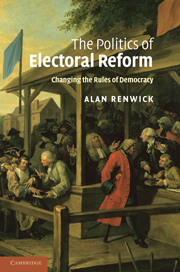PART III - Elite–mass interaction
Published online by Cambridge University Press: 04 May 2010
Summary
The process of reform by elite–mass interaction comprises three stages. First, a minority of politicians espouse reform. They initiate the reform process, but they have insufficient strength by themselves to impose reform through normal legislative channels. They therefore go above the heads of other politicians and take the issue to the people, and this popular mobilization around reform constitutes the second stage of the process. But public opinion on its own cannot generate a new electoral system. Rather, at the third stage, public pressure forces politicians to acquiesce in reforms that, on the whole, they still do not want. The reforms in New Zealand and Italy in 1993 and Japan in 1994 all followed variants of this pattern.
Important questions can be asked of each of the three stages. At the first, where a minority of politicians initiate reform, the key question is why those politicians become interested in the issue. I find there are no universal patterns, but that politicians' genuine beliefs in democratic and other values do typically matter. At the second stage, the most important question is what causes popular mobilization to occur around such an esoteric issue as reform of the electoral system. I argue we need to allow for three factors: inherent weaknesses in the prevailing system; contingent crises that focus attention on these weaknesses; and strategic leadership. At the third stage, finally, we need to understand why politicians bow to popular pressure.
- Type
- Chapter
- Information
- The Politics of Electoral ReformChanging the Rules of Democracy, pp. 167 - 168Publisher: Cambridge University PressPrint publication year: 2010



